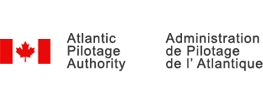FAQ
What is Marine Pilotage?
Marine Pilotage is one of the oldest professions in the world, with reference to pilots found in some of the earliest recorded history. Marine pilots take the conduct of vessels when they are navigating ports, straits, lakes, rivers and other waterways.
The Atlantic Pilotage Authority (APA) is the regulator of marine pilotage in the Atlantic region. As regulator, the APA conducts examinations of qualified candidates and issues Pilot Licences and Certificates. Individuals with Pilot Licences may provide pilotage service to any ship within a designated area, while Pilotage Certificate Holders are restricted to providing pilotage to a ship on which he or she is a regular crew member.
In order to provide pilotage service to the shipping industry, the APA licences and employs professional pilots who must have a thorough knowledge of the local pilotage area, including port infrastructure, prevailing weather and wind conditions, and sub-surface characteristics of the port. Their knowledge must include the handling characteristics of each type of vessel calling on their port so that they will be able to accurately judge the effect of wind, current, and tidal influences on the ship they are piloting. In addition to the knowledge required, pilots must remain in good physical condition so they can safely transfer between a ship and a pilot boat in adverse sea states and weather conditions.
The value of a pilot is realized when they judge an approach correctly, anticipate accurately and react effectively. The professional abilities of pilots are integrated with navigational systems, both visual and electronic, and the support of information services. Such resources enable the Atlantic Pilotage Authority to provide a safe and efficient service to vessels plying the waters of the Atlantic region.
What are compulsory pilotage areas?
The Atlantic Pilotage Authority’s jurisdiction covers all waters in and around the Atlantic provinces. Within this jurisdiction, the APA has designated certain ports or waterways as compulsory pilotage areas in which vessels must have a licenced pilot or pilotage certificate holder on board while under way. Certain vessels are exempted from these requirements (see section 4 of the Atlantic Pilotage Authority Regulations for more details).
What vessels are subject to compulsory pilotage?
Ships meeting certain criteria must have a pilot on board in order to sail within the compulsory areas. In general terms, the following ships are subject to compulsory pilotage within the compulsory areas:
- Canadian registered ships of more than 1,500 gross tons;
- Ships not registered in Canada;
- Oil rigs;
- Pleasure craft over 500 gross tons;
- Any combination of tug and tow, if more than one unit is being towed;
- Ferries that are entering or leaving a port that is not one of their regularly scheduled terminals.
There are several exemptions and exceptions within these categories. The following are examples of vessels are not subject to compulsory pilotage:
- Canadian-government ships;
- Canadian-registered ships that are employed in catching and processing fish or other living resources of the sea;
- Canadian-registered offshore supply vessels of 5,000 gross tons or less that have an operations base in a port located within one of the areas;
Please refer to section 4 of the Atlantic Pilotage Authority Regulations for the complete list of vessels exempted from compulsory pilotage.
What are Pilot Boats?
Pilot boats are purpose built vessels designed and equipped to allow the safe transfer of Pilots to and from ships. A marine pilot is required to board vessels at sea or at a harbour entrance in order to take the conduct of a ship to provide safe navigation and berthing.
Pilot boat services may be owned and operated by the Authority or by a private operator who has a contract with the Authority. The APA has three models for pilot boat operations. In most ports, a contractor provides both the boat and the crew. In two of the major ports, Halifax and Saint John, the Authority owns and operates pilot boats, with the crew being employees of the APA. In Placentia Bay and Sydney, the Authority owns the vessels, with the manning of the boats contracted to a local company. The Authority currently owns eight pilot boats stationed in four ports.
What is a Federal Crown Corporation?
Federal Crown Corporations are companies or enterprises that are owned by the Government of Canada. They are created and operated in order to serve the national interest.
The Atlantic Pilotage Authority is a Crown Corporation as defined by the Financial Administration Act (FAA) and is listed in Schedule III, Part I to that Act. The Authority is required to be financially self-sufficient and does not receive funding from any level of government. The Board Members, or Members of the Authority, and Chair are appointed by the Federal Government.
